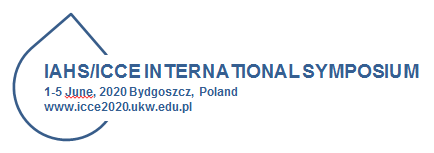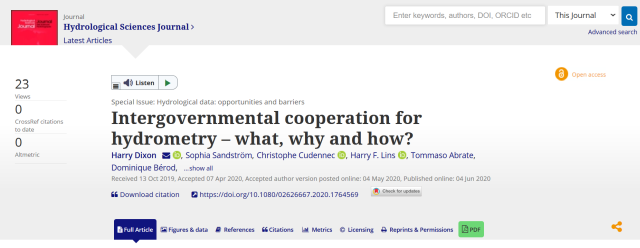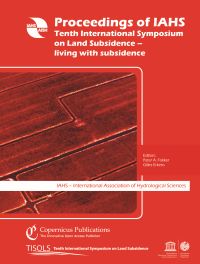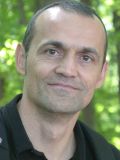IAHS News
Intergovernmental cooperation for hydrometry – what, why and how?
IAHS wish to highlight a new paper in the HSJ Special Issue on Hydrological data: opportunities and barriers which will be of interest to the members active in hydrometry across the world. The open access paper details the WMO mechanisms on hydrometry and illustrates the strong inputs IAHS provides as a partner to WMO activities in the field of hydrology.
Intergovernmental cooperation for hydrometry – what, why and how?
Harry Dixon, Sophia Sandström, Christophe Cudennec, Harry F. Lins, Tommaso Abrate, Dominique Bérod, Igor Chernov, Nirina Ravalitera, Daniel Sighomnou & Florian Teichert
https://www.tandfonline.com/doi/full/10.1080/02626667.2020.1764569
Two thirds of hydrological observation networks in developing countries are reported to be in poor or declining condition. At the same time innovation in sensor technologies and data processing are presenting opportunities for enhancing observation networks that are not being realized. The WMO HydroHub was launched in 2016 to transform assistance to operational water monitoring agencies around the world. If successful, the initiative will increase the amount of hydrometric data available to researchers, catchment managers and water policy makers. To those unfamiliar with UN organizations, however, the nature of such initiatives, the reasoning behind the decisions taken to establish them and the mechanisms by which they try to deliver benefits for society, can be opaque. This paper adopts a novel dialogue-style format to explore the set-up of the WMO HydroHub and build awareness amongst those who ultimately may benefit from its approaches.
This paper is just one example of the firm partnership between the IAHS and the Commission of Hydrology of WMO for over 50 years which ensures a link with the latest developments in the hydrological sciences. Together with UNESCO, IAHS and WMO award the annual International Hydrology Prize medals to two people who have made an outstanding contribution to hydrological science.
‘TISOLS: the Tenth International Symposium On Land Subsidence – living with subsidence’ PIAHS Volume 382 is now available
The papers from the Tenth International Symposium on Land Subsidence due to be held in Delft, the Netherlands in April 2020 are now available open access as PIAHS Volume 382.
Facilitating scientists in exchanging ideas and sharing research results and inspiring stories has always been the aim of the International Symposia on Land Subsidence. Organized by a local organizing committee under the auspices of the UNESCO International Hydrological Programme (IHP) and the UNESCO Land Subsidence International Initiative, already nine successful symposia have been held since the first in Tokyo (Japan) in 1969. Contributions to each International Symposium were published as full papers by the IAHS, thereby creating an impressive collection of papers on land subsidence, freely available and accessible.
Scientists play an important role in providing the data, information, knowledge and tools to allow for well-founded decision making. TISOLS will bring together international experts from around the world to share the latest research and insights on natural and anthropogenically induced land-level lowering. A platform is provided to share our understanding of land subsidence, reliable data, and innovative techniques. Only an integrated effort will facilitate targeted strategies and solutions for long-term sustainable living conditions in subsiding areas. TISOLS takes on the challenge of linking geodetical, hydrological, geotechnical and geological knowledge to policy and socially acceptable solutions. To foster the link between the natural and social sciences and between science and society, five thematic sessions were created: (i) measuring and monitoring land subsidence, (ii) understanding land subsidence, (iii) modelling of land subsidence, (iv) impacts of land subsidence, (v) land subsidence coping strategies. The same themes have been used as chapters in the present PIAHS.
In the winter of 2020, the world has witnessed the pandemic outbreak of COVID-19 or the coronavirus. Quickly it became clear that international travelling was considerably restricted and in the following weeks, large-scale meetings were completely banned. TISOLS 2020, to be held from 20–24 April 2020, had to be postponed to 2021. The new date for TISOLS is 17–21 May 2021, hoping that by then the situation has improved enough to be able to organize a great meeting.
While TISOLS was postponed just weeks before the original date, the Proceedings had almost been finished. It was decided to pursue the publication as planned to share the exciting research results and to do justice to all the work performed. The Proceedings contain a record of 136 papers of high quality from all over the world. The contribution to all five themes, including the themes focusing more on social sciences, is large. They are all essential to deal with land subsidence and we are grateful that we managed to link them here. We hope that this volume of papers will furnish inspiration for land subsidence research and policy formulation around the world, and we look forward to sharing the presented research results of these Proceedings in 2021!
2020 International Hydrology Prize medals
The 2020 recipients of the IAHS-UNESCO-WMO International Hydrology Prize are:
Nominations for the annual Prize are made by National Committees to IAHS, National Committees to the UNESCO-IHP or National Hydrological Advisors to the WMO, and forwarded to the Secretary General of IAHS for consideration by the Nomination Committee. The Committee consists of the President and a Vice-President of IAHS and representatives of UNESCO and WMO.
As of 2014, two medals are awarded under the International Hydrology Prize: the Dooge medal and the Volker medal. Both medals are intended to distinguish outstanding achievements by hydrological scientists but with a different focus. The Dooge medal is aimed at fundamental contributions to the science of hydrology, whereas the Volker medal is aimed at outstanding applications of hydrological science for the benefit of society at large.
https://iahs.info/About-IAHS/Competition--Events/International-Hydrology-Prize.do
Our warmest congratulations go to both recipients.
2020 SYSTA Awardees
The IAHS Sivapalan Young Scientists Travel Awards (SYSTA) initiative was launched in 2018. The aims of SYSTA are to: (1) strengthen attendance of IAHS Meetings from financially disadvantaged countries (FDCs) to address the currently low attendance; and (2) foster high quality science among a new generation of hydrologists.
In early 2020, IAHS were pleased to award nine SYSTA awards up to the maximum award value of €2,000 for attendance at IAHS Commission meetings in 2020. If meetings are postponed or cancelled due to the global pandemic then the awards will be transferred to attendance at the IAHS Scientific Assembly in Montpellier or an IAHS Commission meeting.
The following awards were confirmed for 2020:
9th International Water Resources Management Conference of ICWRS in Cairns, Australia in July 2020.
| Mohammad Merheb | Lebanon |
| Charles Onyutha | Uganda |
STAHY 2020 in Valencia, Spain in September 2020.
| Akinwale Temitope Ogunrinde | Nigeria |
| Mostafa Moradi Dashtpagerdi | Iran |
| Ahmed Mohammed Sami Al-Janabi | Iraq |
| Adarsh Sankaran | India |
Hydrology of the Major African Basins in Cotonou, Benin in November 2020.
| Yao Affoué Berthe | Côte d’Ivoire |
| Ouedraogo Issoufou | Burkina Faso |
| Pilabina Somiyabalo | Togo |
Our warmest congratulations go to all our awardees.
‘Cryosphere and Hydrology’ at Cryosphere 2020

IAHS is co-organizing a session at Cryosphere 2020: International Symposium On Ice, Snow And Water In A Warming World in September 21-24 2020 in Reykjavík, Iceland (https://www.cryosphere2020.is/).
As a result of global atmospheric and ocean warming, all components of Earth’s cryosphere are now changing at a dramatic pace. This symposium will bring together scientists and policy makers for a discussion on the latest results from studies of the entire cryosphere, which plays an important role in the hydrological cycle and the Earth System and is one of the most useful indicators of climate change. The symposium will allow ample time for panel discussions on scientific results, new technologies, research gaps and future perspectives in the light of the Paris Agreement that calls for limiting global warming to 1.5–2°C.
IAHS is inviting presentations and papers for the ‘Snow and ice as a water resource’ session (https://www.cryosphere2020.is/sessions/snow-cover-change-current-capabilities-future-needs) concerning the importance of snow and ice melt as a water resource for mountain region populations and for hydropower utilization; runoff changes due to atmospheric warming and monitoring of changes in lake and river ice. We are soliciting presentations on new and emerging methods and technologies related to observations and research; satellite monitoring, snow trackers and derived products; data integration, data archiving and exchange; studies of the socio-economic impacts of changing snow conditions on runoff and water supply, especially for mountain regions and for improved hydrological forecasting in cold regions; education, capacity building and international cooperation
Abstracts should be submitted through the IGS website (https://www.igsoc. org/abstracts/85a/). A link to the abstract submission page can be found on the conference website (https://www.cryosphere2020.is/). Deadline for submitting abstracts is nominally 15 April 2020, but please check the website for updates and contingency plans for COVID-19.
Registration is now open.
For updates on the symposium contact: [email protected]
Info: Second Circular (PDF)
2020 Summer Schools continued
Dear IAHS members
Please find below announcements of two further Summer Schools which may be of interest to you:
PUB 2020 Summer School, Runoff Predictions in Ungauged Basins (PUB), 6th-10th July 2020, TU Wien (Austria). The purpose of the Summer School is to learn methods for estimating runoff characteristics in the absence of local runoff observations.
https://www.waterresources.at/index.php?id=5&tx_ttnews%5Btt_news%5D=42&cHash=5706733b75eca76e5e74b55392b09193
flyer
The 11th Annual Catchment Science Summer School will run 30th Aug - 4th September 2020 at the University of Birmingham (UK). The course is designed for PhD students and Post Docs in catchment science. The course is taught by Jeff McDonnell, Chris Soulsby, Jan Seibert, Ilja van Meerveld, David Hannah, Stefan Krause and many others. It is co-sponsored by the Global Institute for Water Security at the University of Saskatchewan, the University of Aberdeen, University of Zurich and Humboldt University. Course details can be found at: https://water.usask.ca/hillslope/teaching/catchment-science-summer-school.php .
Students are responsible for their own accommodation - there are inexpensive hotels and bed and breakfast options near the university, as well as Halls of Residence that can be contacted directly. The registration is £499 GBP and can be booked at: https://shop.bham.ac.uk/conferences-and-events/college-of-life-environmental-sciences/school-of-geography-earth-environmental-sciences/pgr-catchment-science-summer-school-2020 .
Enrolment is limited to 25 and is on a first come, first served basis.
Jeffrey McDonnell, FRSC
Please forward to potentially interested people.
Best wishes
Günter Blöschl
IAHS President
2020 Summer Schools
The following summer schools will take place this summer and may be of interest to IAHS members. For more information please contact the organisers directly.
SUMMER SCHOOL: EXTREMES IN WATER SCIENCE
July 12th-17th 2020 at Villa Colombella (Perugia, Italy)http://warredoc.unistrapg.it/en/events/2020-summer-school/
Lecturers
· Richard Vogel
· Simon Michael Papalexiou
· Ilaria Prosdocimi
Background and Goals
The Summer School will focus on advances in statistical theory and applications dealing with extremes in Earth System Sciences, and in Water Science in particular. The aim is to bring PhD students, post-docs, and young scientists from different disciplines together with leading scientists in the fields of statistics of extremes, hydrology, and Earth System Science in general. Towards this aim, the School will be composed of traditional lectures on advanced topics and of group research work lead by the lecturers on topics at the boundary of the state-of-the-art.
Scientific Committee
Roberto Deidda, Salvatore Grimaldi, Marco Marani, Elena Volpi
Hydro-JULES Summer School
Modelling hydrology and global changeJuly 13-17th 2020 at UKCEH Wallingford in Oxfordshire
Course is open to everyone (UK/non-UK; student or professional)
Open for applications until 30th April
The UK Hydro-JULES programme will host up to 15 students for a 5-day Summer School in 2020. The intention is to train undergraduate, post-graduate, early-career and other international junior scientists from the fields of water and the environment, land surface science, water resources, ecology, hydrometeorology, biogeochemistry and other related research areas concerned with the delivery of next-generation land-surface and hydrological predictions.
For more information and an application form please see https://hydro-jules.org/news/hydro-jules-summer-school-2020
Election of Dan Rosbjerg as Honorary President of IAHS
Dan Rosbjerg of the Technical University of Denmark, has not only made outstanding contributions to hydrology in areas such as flood estimation and groundwater modelling and management, but he has also contributed immensely to furthering the hydrological sciences through his activities within IAHS and other international organizations. He was president and vice president of the International Commission on Water Resources Systems (ICWRS) for many years. During 2007-2011 he was vice-president of IAHS. Altogether he served as an IAHS-officer for 24 years in succession which, perhaps, is a record, just as his attendance of 20 IAHS/IUGG meetings in a row. He was editor of 12 IAHS red books where he put a great effort in helping authors to upgrade their papers with respect to language and structure. Dan has also served as Danish delegate to the Intergovernmental Council of the International Hydrological Programme (IHP) of UNESCO and chaired the ad-hoc Governance Committee of IHP, through which he greatly facilitated the collaboration between IAHS and IHP. More recently he has been representing IAHS within the IUGG Commission on Climatic and Environmental Change (CCEC). He is therefore worthy of being elected as Honorary President of the IAHS. In this new role Dan Rosbjerg is once again in an excellent position to further advance the mission of IAHS.
Dan Rosbjerg accepted the position with the following response:
My first contact with IAHS was a paper in the Bulletin of the International Association of Scientific Hydrology in 1970, but it was after 1982 that my engagement with the Association really accelerated. By serving the Association and participating in numerous IAHS meetings, I also got invaluable inspiration from colleagues worldwide. Recently, it was a great privilege for me, together with John Rodda, to help the association by preparing the IAHS contribution to the IUGG centennial jubilee last year resulting in the HGSS paper on the IAHS history. The election as honorary president is much more than I could expect, and I am sincerely grateful for this additional opportunity to serve the Association.
A list of the Officers of IAHS can be found on the IAHS website.
IAHS/ICCE International Symposium 'River sediment quality and quantity: environmental, geochemical and ecological perspectives'
We would like to announce an extension to the registration deadline for the upcoming IAHS/ICCE International Symposium 'River sediment quality and quantity: environmental, geochemical and ecological perspectives'.
The IAHS event will be held in Bydgoszcz, Poland on June 1-5, 2020 (www.icce2020.ukw.edu.pl)
Topics of interest for submission include, but are not limited to:
- Sediment quantity – cascades, budgets, yields
- Sediment impacts on river channel hydromorphology and managment
- Sediment quality – geochemistry, nutrients, contaminants, emerging issues
- Sediment-biota interactions
- Business Day - inland waterways development in Middle-East Europe
Registration is open (click here)
Abstract submission deadline has been extended to March 1, 2020
All participant’s of ICCE 2020 will be able to submit papers to peer-reviewed scientific journals. Four of five journals are indexed on Web of Science (Core Collection) and Scopus. The papers will be reviewed according to requirements of the selected journals.
https://www.geographiapolonica.pl
http://www.aucgeographica.cz
https://ges.rgo.ru/jour
http://acta.urk.edu.pl
http://www.geography.and.tourism.ukw.edu.pl/
Contact Email: [email protected]
Website, Registration and Submission: www.icce2020.ukw.edu.pl
We look forward to welcoming you in June in Bydgoszcz !

Abstract submission is now open for 9th International Water Resources Management Conference
Abstracts are due by January 31st. Please submit your abstract via the link below: https://meetings.copernicus.org/iwrm2020/contribution_management/how_to_submit.html
Full papers that have been accepted and presented at the symposium will be published in the Proceedings of the International Association of Hydrological Sciences (PIAHS).
This event is eligible for IAHS SYSTA travel support.
Regards
Barry Croke and Yongping Wei




